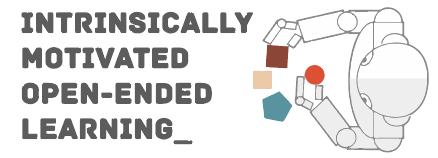 |
| Johann Huber |
| organizer • speaker |
Bio
Johann Huber is currently pursuing the PhD degree at the Institut of Intelligent Systems and Robotics (ISIR) in Sorbonne University, Paris. He studied Robotics, Image processing and AI at the engineering school of Polytech Sorbonne in Paris (MSc). His research interests include robotics manipulation of real robots, evolutionnary algorithms and reinforcement learning. He works under the supervision of Stéphane Doncieux, Faïz Ben Amar, and Miranda Coninx. Supported by SCAI (Sorbonne Center for Artificial Intelligence), his research aims to contribute to serveral european project, including Learn2Grasp and euROBIN.
Talk
Open-Ended Learning for robotic agents requires basic skills to interact with their environments. Grasping is arguably the most crucial one, as it is the prerequisite for many manipulation tasks. However, the sparsity of grasping reward makes it a very challenging task, which is solved under strong constraints on the operational space (top-down movements, parallel grippers, imitation learning from few demonstrations).
The greatest AI results of the past decade demonstrated that generalization requires large datasets, preferably of high quality and good balance. Recent attempts to build datasets for robotic grasping show that many researchers consider this matter one of the most critical for leading to breakthroughs in robotic skill learning.
Quality-Diversity (QD) methods are algorithms that optimize both quality and diversity, resulting in large sets of diverse and high-performing solutions. This growing domain demonstrated great results in neuroevolution, recovery from injury, swarm robotics, and many other applications. An increasing number of works consider QD methods as dataset generators, allowing control of the diversity, quality, and balance of the produced data.
This talk presents recent works on applying QD methods to grasp dataset generations. Far from previously considered tasks in the field, addressing grasping leads to new optimization challenges: sparse reward but also sparse interaction. It leads to different optimization problems in which the standard QD methods get unexpected properties. The presented studies question the nature of skill acquisition, the properties one might expect from exploration-oriented algorithms, the synergies between optimization methods for learning in robotics, and the perspective of Open-Ended learning research for real-world robotics.
